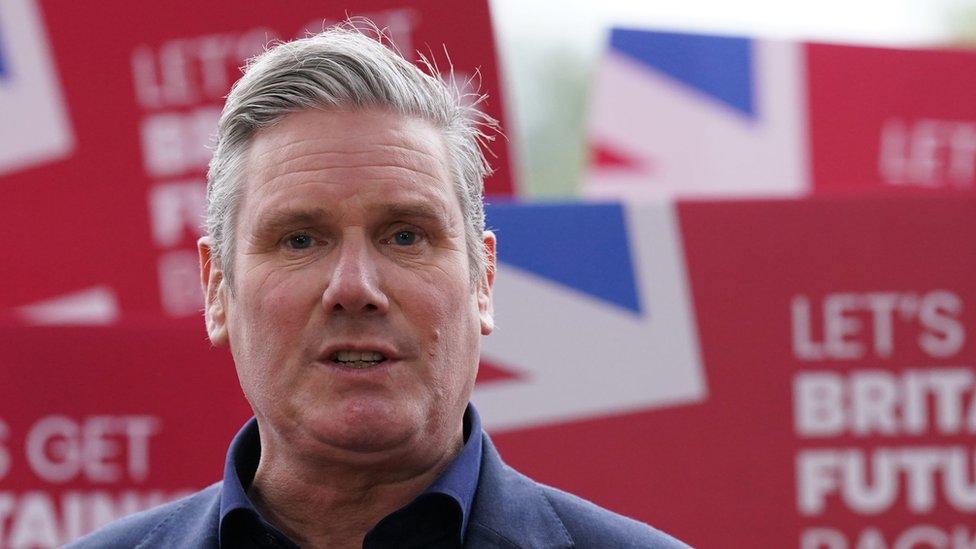Will SNP motion highlight division in Labour Party?
- Published
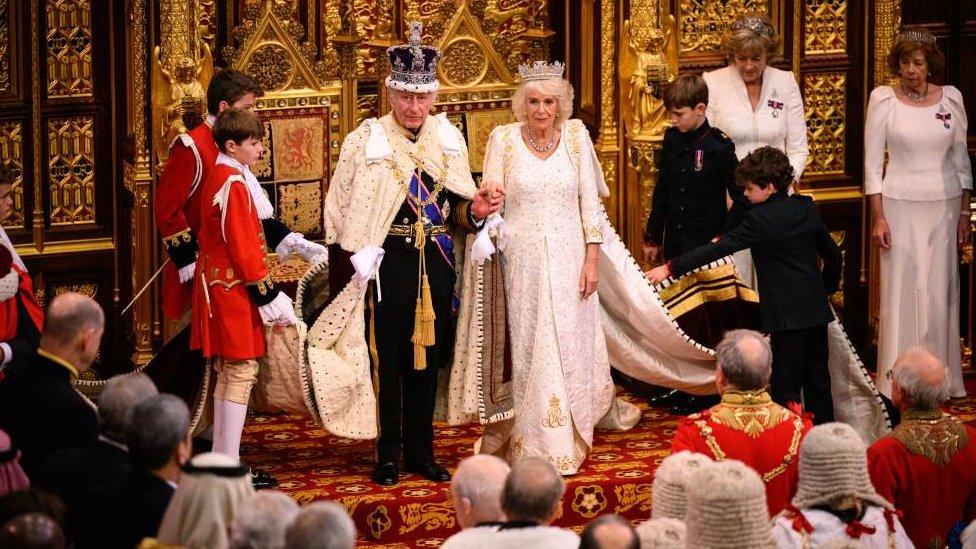
King Charles III delivered his speech at the opening of Parliament last week
As the House of Commons debate on last week's King's Speech comes to an end on Wednesday, some parliamentary shenanigans have come into play.
The SNP are attempting to amend the motion which would embed within it calls for an immediate ceasefire in Gaza.
It needs to be selected by the speaker of the House of Commons in order for any vote to go ahead.
King Charles III delivered the speech at last week's opening of parliament.
So-called "amendments" are attempts by groups of MPs to tweak legislation or motions - a proposal put forward for debate or decision - to reflect issues they consider not to have been sufficiently addressed. These changes normally have to be voted on by MPs.
The current thinking is that Keir Starmer will tell his MPs not to vote on this - so anyone that does will be defying those orders.
Labour plan to submit their own amendment on Gaza, highlighting the scale of civilian casualties but stopping short of backing a ceasefire. The thinking from those in Scottish Labour is it makes Labour appear more "proactive", taking the issue head-on and trying not to let the SNP dictate the narrative.
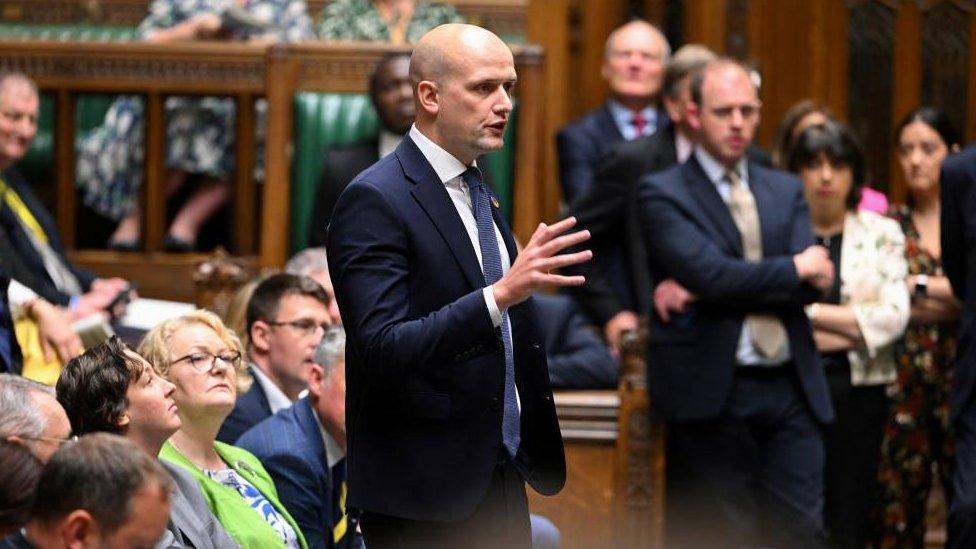
The SNP's Westminster leader Stephen Flynn is expected to use the debate to call for a ceasefire in Gaza
The SNP's Westminster leader Stephen Flynn has penned an open letter to MPs calling on them to back the plans and "not give the green light to collective punishment".
Given all this is at the speaker's discretion, there's also a scenario where none of this comes into play.
But nonetheless, let's take a step back - what's going on here, and what's at stake?
'Ceasefire' or 'pause'?
The SNP have been clear in their position calling for an immediate ceasefire in Gaza pretty much from the beginning of the Israeli response to the brutal Hamas killings on 7 October.
Keir Starmer, however, has resisted calls from some within his own party to do the same, instead focusing on the need for an immediate "humanitarian pause" - despite Labour's leader in Scotland, Anas Sarwar, joining those calls for a ceasefire.
Anas Sarwar has also argued however that the language differences are "dancing on the head of a pin" - but many within his own party would beg to differ.
One side is calling for an immediate cessation in hostilities because of growing concerns about the humanitarian situation in Gaza, while another is calling for a temporary halt because of fears any cessation would embolden Hamas, among other reasons.
For many in Labour, including the many councillors in England who have resigned from the party and a shadow minister who quit his post, Keir Starmer's arguing for the latter is not showing sufficient solidarity with the plight of those in Gaza under siege.
Starmer's authority
Mr Sarwar said comments in a radio interview whereby Keir Starmer appeared to back Israel cutting off food and water supplies to Gaza were "hurtful".
So it's clear the conflict has magnified differences of opinion on a major issue (and one that has long energised the Labour Party membership) at a time when they're hoping to keep the flame alive from that Rutherglen and Hamilton West by-election win, and woo back Scotland on the scale many polls are suggesting ahead of the next general election.
And here's where the SNP sense an opportunity.
Though the need for an immediate ceasefire is a passionate, genuine and widely-held feeling within the SNP, the raw politics of this also points to an opportunity for a recently weakened SNP to exploit the first significant party management issue Keir Starmer has faced for some time.
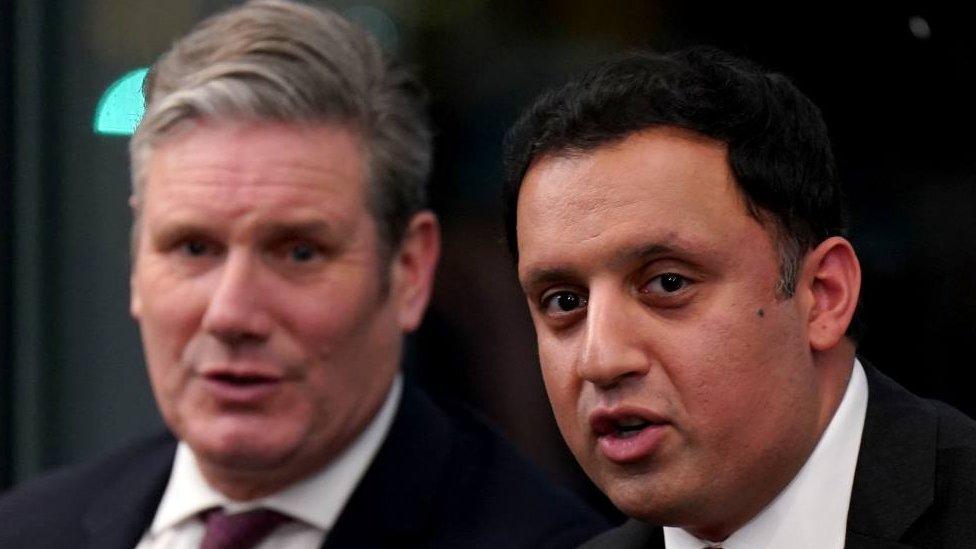
The UK Labour leader and the Scottish Labour leader have differing views on the issue
Any vote on a ceasefire in the Commons, it's hoped, would show the scale of support within the Labour Party for it despite the party line on advocating for a "pause", and potentially present a direct challenge to Keir Starmer's authority if shadow frontbenchers feel they must resign so MPs can vote with their conscience.
That will be held up by the SNP as a Labour Party in disarray.
Anas Sarwar's decision to call for a ceasefire in part is a fightback against the narrative that's long haunted the party, made by the former Scottish Labour leader, Johann Lamont, years ago that Scottish Labour is just "a branch office of a party based in London" and not a party that makes its own decisions.
A big SNP focus when it comes to this vote is on what Scotland's two Labour MPs choose to do, one of whom is Labour's shadow Scotland secretary.
In a letter to Anas Sarwar, First Minister Humza Yousaf piled the pressure on those MPs to vote with the SNP.
It's expected however that they will resist, and stick with Keir Starmer.
Beyond the shenanigans
Scottish Labour figures are dismissive about the impact all this will have on their chances of a comeback in Scotland and believe people have better things to do than pay attention to complicated parliamentary procedure - they might be right.
But whatever happens in the Commons (remember, this is all at the speaker's discretion), the actions of the SNP have caused enough chatter and frustration to indicate that all this goes beyond simple parliamentary manoeuvrings.
The Gaza conflict isn't going away anytime soon, and Labour's problems aren't going away on this either while the UK leadership seek to hold firm and keep their position in line with that of crucial allies such as the US, as well as the prime minister, a role Keir Starmer is hoping to emulate as much as possible in preparation for potentially entering No 10 himself sometime in the next year.
So beyond what happens in the chamber, expect the SNP to continue to seize on this issue to try and demonstrate that the Labour Party is still too busy arguing with itself to possibly deliver for people in Scotland, as well as to argue that despite what Scotland's Labour leaders might say, Scotland's two Labour MPs in Westminster really answer to Keir Starmer.
Despite Anas Sarwar proclaiming recently that he and Keir Starmer enjoy the closest relationship between any two Scotland-UK Labour leaders since devolution, it's clear that there remains plenty of ways between now and the general election that that relationship can be put to the test.
Related topics
- Published7 November 2023

- Published15 November 2023
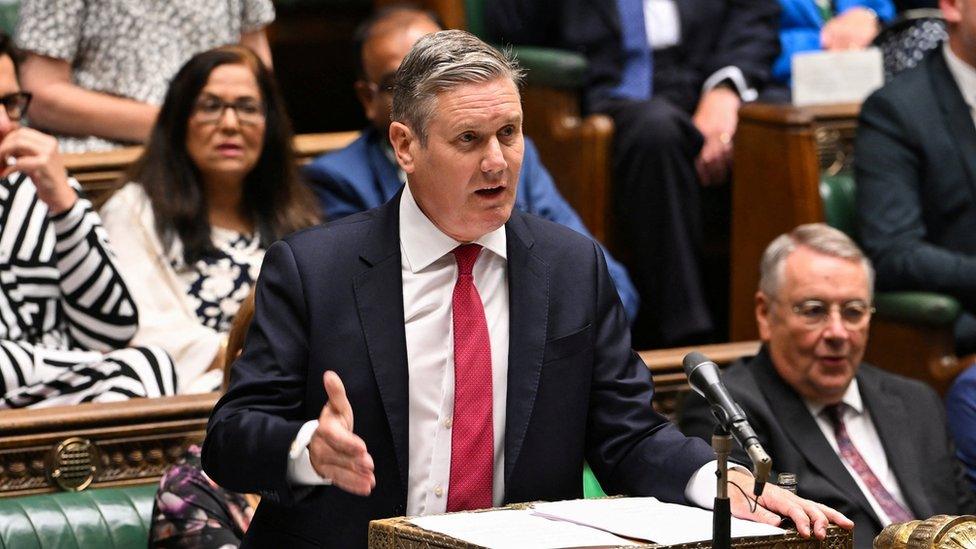
- Published27 October 2023
